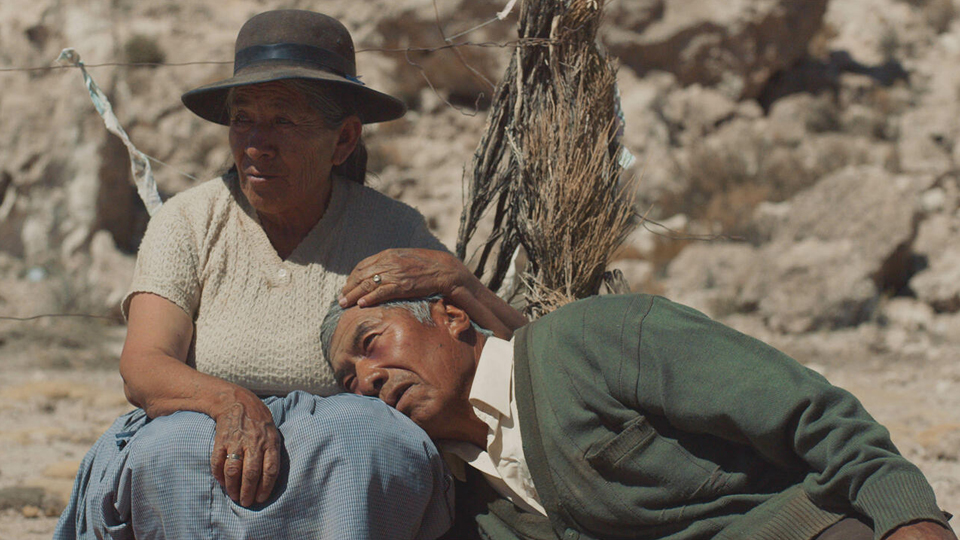Utama
Regie: Alejandro Loayza Grisi
Vorstellungen im Kino
311 - Sa, 11:00, im Kino 1 online Kontingent verbraucht

Zum Trailer
Inhalt
Im Hochland Boliviens herrscht anhaltende Dürre. Die Erde ist ausgetrocknet, Teile der Quechua sprechenden Bevölkerung sind bereits weggezogen. Virginio und Sisa, ein altes Paar, dem eine Lamaherde gehört, ist jedoch geblieben. Jeden Tag treibt der schwerkranke Virginio die Lamas durch die ausgedörrte Landschaft. Eines Tages kommt Clever, der Enkel der beiden, und hofft, sie mit in die Stadt zu nehmen. Nun stellt sich noch einmal verstärkt die Frage, was das Leben ausmacht, welchen Stellenwert man der Tradition angesichts des Wandels der Zeiten geben möchte – und wie und wo man sterben will.
Storyline
In the Bolivian highlands, an elderly Quechua couple has been going about the same daily routine for years. When an uncommonly long drought threatens their entire way of life, Virginio and Sisa face the dilemma of resisting or being defeated by the passage of time. When their grandson Clever arrives, hoping to take both of them to the city, the three of them must face, each in his or her own way, the environment, the necessity of change, and the meaning of life itself.
Über den Film
Bolivian director Alejandro Loayza Grisi started his career as a photographer then turned to cinematography; now he makes his feature debut with this slow and beautiful-looking drama set high on the Andean plateau. It’s a film that unfolds at such a measured pace that at times it felt to me like a piece of cinematic mindfulness or a concentration training exercise. I wouldn’t have been surprised if a voiceover gently interrupted proceedings, like a mindfulness app, to gently instruct us not to let our thoughts wander.
UTAMA opens with the staggeringly gorgeous image of an elderly man walking towards the sun rising golden over mountains. This is Virginio (José Calcina), whose weathered face is as cracked as the earth beneath his feet. Virginio spends his days tramping across the plain grazing his flock of fluffy llamas; he and his wife Sisa (Luisa Quispe) live without running water or power. They are a couple in real life, non-professionals discovered by Grisi as he drove around scouting locations. You can see that closeness in every gesture, in Sisa’s arthritic fingers tenderly patting her husband’s hand.
It’s Sisa’s job to fetch water while Virginio grazes the llamas. The trouble is that rain has stopped coming to the region; the village well has dried up. “Time has gotten tired,” a friend tells Virginio, to explain the drought. But the truth is that climate change is making life unbearable – not that global warming is ever spoken about.
In fact, until the couple’s grandson Clever (Santos Choque) shows up wearing a hoodie, we could just as easily be watching a film set in the 1920s as the 2020s. Clever wants his grandparents to move to the city with the rest of the family. What he fails to understand is that the question for Virginio and Sisa is not where to live, but where to die. And when they are gone, there will be no one left in the family to speak the indigenous Quechua language or live their way of life. It’s a gentle and superbly shot film.
theguardian.com
Preise
2022 World Cinema Grand Jury Prize: Dramatic Sundance Film Festival
| Regie | Alejandro Loayza Grisi |
| Drehbuch | Alejandro Loayza Grisi |
| Kamera | Barbara Alvarez |
| Schnitt | Fernando Epstein |
| Ton | Fabian Oliver |
| Musik | Cergio Prudencio |
| Produzent | Federico Moreira |
| Darsteller | Jose Calcina (Virginio), Luisa Quispe (Sina), Santos Choque (Clever), Candelaria Quispe (Elena) |
